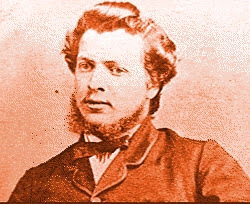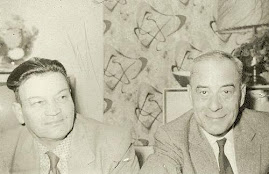November 16 marks the anniversary of the death of Louis Riel. It is the time where Métis people take a moment to remind themselves of their past leader who lived, walked, talked and died for his people. Riel believed he was a prophet for his people and continued on his vision. Some tried to portray his as crazy but even in his own record of writings he was a man of great vision.
Today we along with many Canadians acknowledge him as the founder of the Province of Manitoba and defender of the rights of the Métis and of French Canadians.
During his last days at his trial he was allowed to address the jury and he first spoke to God and thanked him for blessings for everyone in the court, including the prosecutors. He then shared the plight of the Aboriginal people: “When I came into the North West in July, the first of July 1884, I found the Indians suffering. I found the half-breeds eating the rotten pork of the Hudson Bay Company and getting sick and weak every day. Although a half breed, and having no pretension to help the whites, I also paid attention to them. I saw they were deprived of responsible government, I saw that they were deprived of their public liberties. I remembered that half-breed meant white and Indian, and while I paid attention to the suffering Indians and the half-breeds I remembered that the greatest part of my heart and blood was white and I have directed my attention to help the Indians, to help the half-breeds and to help the whites to the best of my ability.”
“… I have made petitions with others to the Canadian Government asking to relieve the condition of this country. We have taken time; we have tried to unite all classes, even if I may speak, all parties. Those who have been in close communication with me know I have suffered, that I have waited for months to bring some of the people of the Saskatchewan to an understanding of certain important points in our petition to the Canadian Government and I have done my duty. I believe I have done my duty. It has been said in this box that I have been egotistic. Perhaps I am egotistic. A man cannot be individuality without paying attention to himself. He cannot generalize himself, though he may be general. I have done all I could to make good petitions with others, and we have sent them to the Canadian Government, and when the Canadian Government did answer, through the Under Secretary of State, to the secretary of the joint committee of the Saskatchewan, then I began to speak of myself, not before; so my particular interests passed after the public interests.”
“...If I was a man of today perhaps it would be presumptuous to speak in that way, but the truth is good to say, and it is said in a proper manner, and it is without any presumption, it is not because I have been libeled for fifteen years that I do not believe myself something. I know that through the grace of God I am the founder of Manitoba. I know that though I have no open road for my influence, I have big influence, concentrated as a big amount of vapour in an engine. I believe by what I suffered for fifteen years, by what I have done for Manitoba and the people of the North-West, that my words are worth something. If I give offence, I do not speak to insult. Yes, you are the pioneers of civilization, the whites are the pioneers of civilization, but they bring among the Indians demoralization.”
“…If I have any influence in the new world it is to help in that way and even if it takes 200 years to become practical, then after my death that will bring out practical results, and then my children's children will shake hands with the Protestants of the new world in a friendly manner. I do not wish these evils which exist in Europe to be continued, as much as I can influence it, among the half-breeds. I do not wish that to be repeated in America. That work is not the work of some days or some years, it is the work of hundreds of years.”
“…I am glad that the Crown have proved that I am the leader of the half-breeds in the North-West. I will perhaps be one day acknowledged as more than a leader of the half-breeds, and if I am I will have an opportunity of being acknowledged as a leader of good in this great country. “
“…while I am working more than any representative in the North-West. Although I am simply a guest of this country - a guest of the half-breeds of the Saskatchewan - although as a simple guest, I worked to better the condition of the people of the Saskatchewan at the risk of my life, … to better the condition of the people of the North-West, I have never had any pay. It has always been my hope to have a fair living one day. It will be for you to pronounce - if you say I was right, you can conscientiously acquit me, as I hope through the help of God you will. You will console those who have been fifteen years around me only partaking in my sufferings. What you will do in justice to me, in justice to my family, in justice to my friends, in justice to the North-West, will be rendered a hundred times to you in this world, and to use a sacred expression, life everlasting in the other. “
“…the half-breeds of the North-West would have made conditions of a nature to preserve for our children that liberty, that possession of the soil, without which there is no happiness for anyone; but fifteen years of suffering, impoverishment and underhand, malignant persecution have opened our eyes; and the sight of the abyss of demoralization into which the Dominion is daily plunging us deeper and deeper every day, has suddenly, by God's mercy as it were, stricken us with horror. And the half-breed people are more afraid of the hell into which the Mounted Police and their Government are openly seeking to drive us, than of their firearms, which, after all, can only kill our bodies. Our alarmed conscience have shouted out to us: Justice commands us take up arms. Dear relatives and friends, we advise you to pay attention. Be ready for everything. Take the Indians with you.”
Though his writings were set 122 years ago they are just as profound today. To see his commitment to return people through uniting them, fighting for the rights of our people and sacrificing himself in poverty, family and life’s benefits to fight for the cause he believed in. He eventually paid the ultimate price by paying with his life. He advised the jury in his trial that, “…I have writings, and after my death I hope that my spirit will bring practical results.” I encourage Métis people take the time to research the writings – many are still available – it is enlightening and enriching and will still help us today in finding those practical results.
We need to be cognizant of the leaders that we pick today. Do they fight for our cause before themselves? Do they work to unite our people and find the means to work with the world harmoniously? Do they place the Métis Nation in a place where we can be proud and the work that they do will be what guides our great grandchildren 200 years from now.
It concerns me when I hear that instead of uniting our people and working to have government move the Métis agenda forward – we spend our resources and our spirits suing each other and fighting each other. Louis Riel had Métis people in his community that opposed him and his beliefs – he forgave them and spoke about the manipulation of government to divide his people. I encourage people to select our leaders based on the same values and principles that our Fore Father Louis Riel lived by. I suspect many of our leaders would fall far short of the standard he set.
Sunday, November 18, 2007
A Time to Remember
Posted by
MetisMama
at
8:00 PM
![]()
![]()
Subscribe to:
Post Comments (Atom)





No comments:
Post a Comment